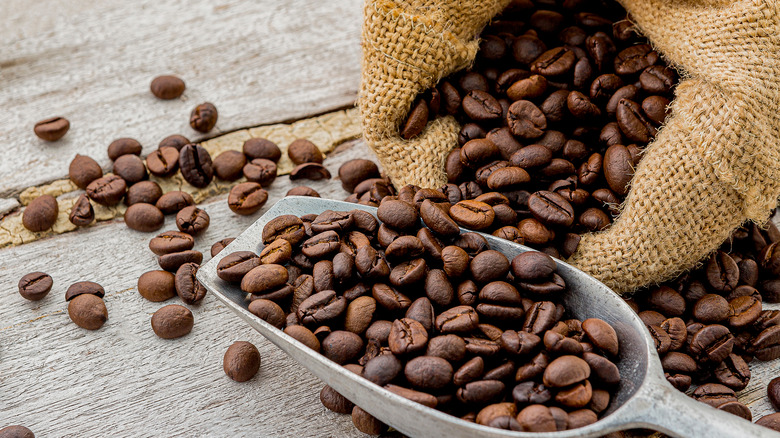Where Your Starbucks Coffee Beans Really Come From
Starbucks shares that they buy 3% of all the world's coffee beans, which are roasted in 900-pound batches before shipping to thousands of locations worldwide. But where in the world does the coffee come from before it becomes a part of your Frappuccino or Pumpkin Spice Latte?
Much of the world's coffee is grown in the Coffee Belt, an area near the Equator roughly between the Tropic of Cancer in the Northern Hemisphere and the Tropic of Capricorn in the Southern Hemisphere (per the National Coffee Association). Coffee grows best in this region due to a combination of rich soil, high humidity, and proper altitudes, with the three primary areas being Latin America, Africa, and Asia/Pacific.
The origin of the beans influences the taste of the coffee, too. African coffees tend to have more tart, fruity tasting notes, while Pacific coffees are often more herbal and earthy. Latin American blends can have more nutty and chocolatey flavors (per Starbucks At Home). Tracking down where Starbucks' coffee really grows within the Coffee Belt reveals the intricacies and challenges of such a globalized supply chain.
The truth behind Starbucks coffee sourcing
The popular chain's coffee is sourced from over 30 countries, and Starbucks says that upwards of 400,000 farmers worldwide contribute to the batches they purchase. Many Starbucks blends are made from Latin American coffees, the company says, however, more unique roasts are sourced from Africa and the Asia/Pacific region. In this region, Starbucks is continuing its focus on Indonesian coffee, like Java and Sumatra which are big names in coffee lingo. Starbucks has been purchasing coffee from Indonesian farms since 1971, the year the company was founded (per Daily Coffee News).
However, there's a dark truth behind Starbucks' coffee plantations. Human rights violations have been uncovered at some Latin American farms that supply them with coffee. At one farm in Guatemala, children under 13 were found to be working eight hours a day, six days a week, for very low wages, per The Guardian. And in Brazil, coffee was picked with what Mongabay called "slave labor" — unsettlingly, at a farm that had previously earned Starbucks' C.A.F.E. Practices ethics certificate.
The company does have a statement on its website claiming that they "integrate respect for human rights throughout our Supply Chain," but when outsourcing goods from other countries, that may be challenging to stand by.

